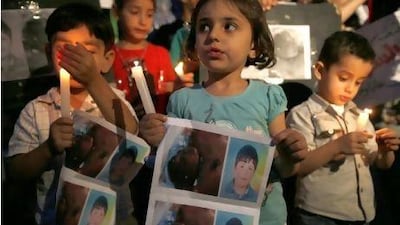DAMASCUS // All through Syria's 10-week uprising, authorities in Damascus have tried to prevent localised demonstrations from linking up and becoming a cohesive, nationwide movement.
Those efforts may have been finally undone with the death of a Syrian teenager, Hamza al Khatib, who has quickly become a unifying symbol of the popular revolt.
Hamza, a 13-year-old from the southern city of Deraa, was tortured and killed by Syrian security forces, according to activists and human-rights campaigners. His mutilated body was returned to his family last week and, outraged, they allowed a graphic video of his corpse to be posted online before he was buried.
The shocking footage has since been widely broadcast on news channels. Activists and political analysts say it has provoked a wave of outrage among ordinary Syrians that has greatly boosted anti-government sentiment and will increase the number of people taking part in demonstrations.
"There isn't a single Syrian who doesn't know the name Hamza al Khatib," said one political analyst, on condition of anonymity. "The question now is, will this case be enough to push the silent majority to join demonstrations or will they remain silent?"
Syrian authorities have tried to limit the damage done to their reputation. Hamza's parents were invited to meet President Bashar al Assad on Tuesday. After expressing his sympathy, Mr al Assad ordered an investigation into the case with a promise to rapidly find the truth and see that the perpetrators face justice.
State media quoted Hamza's father as saying the Syrian leader had "engulfed us with his kindness [and] graciousness".
In addition, Syrian television has sought to debunk the claims of torture. Citing medical records, the state-run Sana news agency said there was no indication of physical abuse to Hamza beyond fatal gunshots. It suggested that those who made the video were responsible for the mutilation in an attempt to smear the government.
The shooting of such a young boy was blamed by officials on the "armed gangs" the Syrian government insists it is fighting in a counter-insurgency campaign. Activists have dismissed the state media reports as crude propaganda. They claim that after being arrested by security units at an anti-government demonstration in Deraa, the epicentre of the uprising, Hamza was detained for a month, tortured and murdered.
A civil-rights activist in Damascus said that in the absence of a truly independent and professional coroner's inquiry, the exact circumstances of the death would remain disputed. He also said that the facts no longer mattered in terms of the effect on protests.
"It's very, very significant, it is uniting protesters across the country," he said on condition of anonymity. "Many people, including children, have been arrested and abused and killed by the security and Hamza represents them."
He said today's demonstrations, now a regular Friday occurrence, would be held in Hamza's name. Even if the Syrian government conducts a quick investigation and makes a public announcement, it is unlikely to stop Hamza from becoming a powerful martyr for a protest movement that, until now, has not had a salient symbol around which to unite.
"If the government says Hamza was not tortured by the security, no one will believe it, and if they say he was, then they'll be admitting they are involved in the murder and torture of children," said the political analyst. "However this comes out, they lose."
With members of the international community seeking to increase pressure on Damascus, the Hamza case has also assumed global importance.
Human-rights groups are seeking to have Syrian officials referred to the International Criminal Court on allegations of crimes against humanity. Hamza's death may end up as a rallying point for those efforts.
The US secretary of state, Hillary Clinton, referred to Hamza by name, saying his death had come to symbolise what "for many Syrians is the total collapse of any effort by the Syrian government to work with and listen to their own people".
Inside Syria there is still a debate about the case. Government supporters said it made no sense that his body would be returned showing clear evidence of brutal physical abuse. Anti-government figures say security units are so arrogant and violent they would have no qualms about such an act.
"Hamza's case will not change people's minds. The pro-government will dismiss it as a hoax. Those anti-government will rally to it," said the Damascus-based dissident. "But it could be what pushes those who have been sitting on the fence to come out against the authorities, and that would be big."

